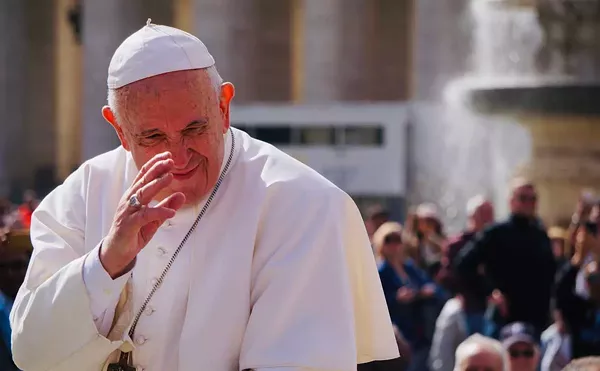
Audio By Carbonatix
[
{
"name": "GPT - Leaderboard - Inline - Content",
"component": "35519556",
"insertPoint": "5th",
"startingPoint": "3",
"requiredCountToDisplay": "3",
"maxInsertions": 100,
"adList": [
{
"adPreset": "LeaderboardInline"
}
]
}
]
If North Carolina is Eden, tobacco is the serpent, the bright green leaf which can look so beautiful lying on the ground but causes so much suffering and death. Filmmaker and North Carolina native Ross McElwee has made several documentaries about his Southern past and present, most famously Sherman’s March. He takes a discursive, essayist approach to this topic of family histories and legacies in this low-key and often droll film.
McElwee’s musings about his family’s past are stimulated when he’s introduced to the 1950 film Bright Leaf by a film-buff cousin. He’s struck by some parallels between the movie’s story and that of his own family, and begins to wonder if the film could be a fictionalized account of his great-grandfather’s failed attempt to found a tobacco dynasty. His great-grandfather was defeated at the hands of the rival Duke clan, tobacco barons famous for their Bull Durham brand and founding Duke University. That the Dukes have become near-legendary figures while McElwee’s own family has languished in relative obscurity seems to be a real thorn in the filmmaker’s side — though one suspects he’s exaggerating his concern a bit for the sake of the documentary.
The Bright Leaf that has captured his imagination was a mediocre movie with an A-list director, Michael Curtiz (Casablanca, Mildred Pierce), and a top-notch cast headed by Gary Cooper and Patricia Neal. To justify his idée fixe that the movie is about his family, he devises a somewhat vague theory that a fictional film can encompass implied documentary aspects. He presents this idea to (appropriately enough) film theorist Vladic Petric, who comes across as a caffeine-addled mad scientist who can’t stop his brain from making connections. Petric knows his stuff, commenting on Bright Leaf’s cinematographer Karl Freund (who went from German expressionistic movies in the ’20s and ’30s to filming I Love Lucy episodes in the ’50s), but he’s not buying McElwee’s premise. An interview with Patricia Neal sheds no light either, and it’s not until he gets closer to the source of the film, interviewing the widow of the novelist who wrote the original story, that the truth about the connection between the movie and McElwee’s family history becomes clear.
The pursuit of this connection is really just a somewhat contrived thread that McElwee has devised to explore the insidious nature of tobacco addiction and the ambiguity of present-day tobacco growers toward the product, with many cogent observations along the way. Sometimes it’s hard to tell when McElwee’s narration is being pretentious or just tongue-in-cheek, but the heart of the film is a tribute to his late father, a doctor who worked with many cancer patients. It’s genuinely moving and makes up for the movie’s less focused passages.
Showing at the Detroit Film Theatre (inside the DIA, 5200 Woodward Ave., Detroit), Friday and Saturday, Oct. 1-2, at 7 and 9:30 p.m.; and on Sunday, Oct. 3, at 4 and 7 p.m. Call 313-833-3237.
Richard C. Walls writes about film for Metro Times. E-mail letters@metrotimes.com.





